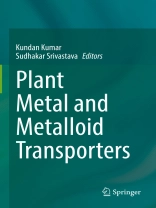This edited book stands as a one place knowledge hub for plant metal(loid) transporters. The book comprehensively covers holistic aspect of metal(loid) transporters involved in uptake and translocation of essential as well as toxic metal(loid)s. Essential and beneficial metal(loid)s are required in every biological process for normal plant growth and development, however in excess they are toxic. There are toxic metal(loid)s also whose accumulation in plants interferes with normal cellular functioning and hampers growth of plants. Hence, metal(loid) uptake and accumulation in plants is a highly regulated phenomenon involving the role of several transporters, enzymes, metabolites, transcription factors and post translational modifications. The book contains chapters from the experts and the contents of the book are presented in simple language and represented through beautiful and scientifically informative figures and tables. This book is of interest to teachers, researchers, doctoral and graduate students working in the area of plant physiology, environmental biotechnology, plant biotechnology metal(loid) stress, phytoremediation and crop biofortification.
Содержание
Chapter 1. Plant Metal and Metalloid Transport.- Chapter 2. Heavy Metals: Transport in Plants and their Physiological and Toxicological Effects.- Chapter 3. The Role of ABC Transporter in Metal Tranasport in Plants.- Chapter 4. Cadmium, A Non-Essential Heavy Metal: Uptake, Translocation, Signaling, Detoxification, and Impact on Amino Acid Metabolism.- Chapter 5. Natural Resistance Associated Macrophage Proteins (NRAMP): Functional Significant of Metal Transport in Plants.- Chapter 6. Role of Heavy Metal Atpases in Transport of Cadmium and Zinc in Plants.- Chapter 7. The Versatile Role of Plant Aquaglyceroporins in Metalloid Transport.- Chapter 8. The Multidrug and Toxic Compound Extrusion (MATE) Family in Plants and Their Significance in Metal Transport.- Chapter 9. Molecular Mechanism of Aluminium Tolerance in Plants: An Overview.- Chapter 10. Functional, Structural, and Transport Aspects of ZIP in Plant.- Chapter 11. The Function of HAK as K+ Transporter and AKT as Inward Rectifying Agent in The K+ Channel.- Chapter 12. The Mechanism of Silicon Transport in Plants.- Chapter 13. The Copper Transport Mechanism in Plants.- Chapter 14. Plant Metal Tolerance Proteins: Insight Into their Roles in Metal Transport and Homeostasis for Future Biotechnological Applications.- Chapter 15. Co-Transport Mechanism in Plants for Metals and Metalloids.- Chapter 16. Metal Nanoparticles Implication, Transport, and Detection in Plants.- Chapter 17. Transcription Factors and Metal Stress Signalling in Plants.- Chapter 18. Heavy Metal Transporters, Phytoremediation Potential and Biofortification.- Chapter 19. Phytoremediation and Biofortification: Contrasting Yet Similar Approaches of Manipulating Plant Metal(Loid) Homeostasis for Societal Benefit.
Об авторе
Dr. Kundan Kumar is presently working as an Associate Professor at the Department of Biological Sciences, Birla Institute of Technology & Science Pilani, K. K. Birla Goa Campus. He completed his Ph.D. in Plant Molecular Biology at National Institute of Plant Genome Research, New Delhi, India. He did his post-doctoral studies at University of Massachusetts Amherst, USA and Mc Gill University, Canada from 2009 to 2012. He has more than fifteen years of research experience in the area of Plant Molecular Biology and Stress Physiology with focus on the role of plant aquaporins in metalloid transport. He has published more than 45 publications in International and National Journal of repute. Dr. Kumar was recipient of Young Scientist Award from the Science and Engineering Research Board (SERB) in 2012 and life member of several societies. He is an elected member of Plant Tissue Culture Association of India (PTCAI). He was a reviewer for various International Journals and serves as an Associate Editor for two International journals.
Dr. Sudhakar Srivastava is presently working as an Assistant Professor at the Institute of Environment and Sustainable Development (IESD), Banaras Hindu University (BHU). He completed his M.Sc. and Ph.D. in Botany at the University of Lucknow. He also served as a Scientific Officer at Bhabha Atomic Research Centre (BARC), Mumbai from 2009 to 2014. He has more than nineteen years of research experience in the field of plant-metal interactions, with a major focus on arsenic stress responses in plants. He has published 85 research articles and 40 review and letter articles in high-impact international and national journals. He has also received several awards for his contributions, including a Fellow of International Society of Environmental Botanists, 2020, Young Scientist Award from the National Academy of Sciences, India (NASI), Allahabad in 2011, Young Scientist Award from Uttar Pradesh Council of Science & Technology (UPCST) in 2013-2014, and Young Scientist Award from the Science and Engineering Research Board (SERB) in 2015. Dr. Srivastava is also an Associate of the National Academy of Agricultural Sciences (NAAS) and a life member of several societies as well as non-governmental organizations and serves as an Editor for respected international journals. He was included among the top 2% of world scientists in 2020.












